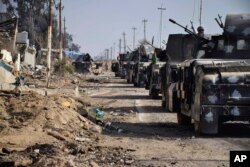Iraqi Prime Minister Haider al-Abadi has reiterated that Turkish military forces must withdraw immediately from Iraqi territory.
In a phone call with Turkish Prime Minister Ahmet Davutoglu Wednesday, Abadi questioned why Turkey would send its military trainers "deep inside Iraqi borders," while Islamic State fighters are present at Turkey's border with Syria, according to Iraqi state television.
Abadi accused Turkey of failing to respect an agreement to withdraw its troops from northern Iraq, and he threatened military action to defend Iraq's sovereignty.
The threat comes as Iraq accused Turkey of only partially withdrawing its tanks and soldiers in order to protect its training camp in Bashiqa in northern Iraq. But Davutoglu dismissed the threat, saying Iraqi forces should focus on Islamic State.
Pockets of resistance in Ramadi
Meanwhile, days after taking control of key areas of the western city of Ramadi, Iraqi security forces say pockets of resistance from Islamic State fighters still pose a risk in and near the city. Ramadi, devastated by U.S.-led coalition airstrikes and IS occupation, is riddled with booby traps and improvised explosive devices.
The United Nations estimates it will take $20 million to rebuild the city and resettle its residents.
Veteran U.S. diplomat James Jeffrey, who was once stationed in Baghdad, told VOA's Victor Beattie that IS fighters will eventually be driven out of the city.
"This city is primarily under the control of Iraqi forces at this point," said Jeffrey, who is now with the research organization the Washington Institute for Near East Policy. "They have a huge numerical superiority. They hold terrain and only a small percent of their forces are good in attacking ISIS. Most of the forces can hold terrain once they've gotten in there. So they're just going to continue squeezing the ISIS people, and eventually they will be driven out."






